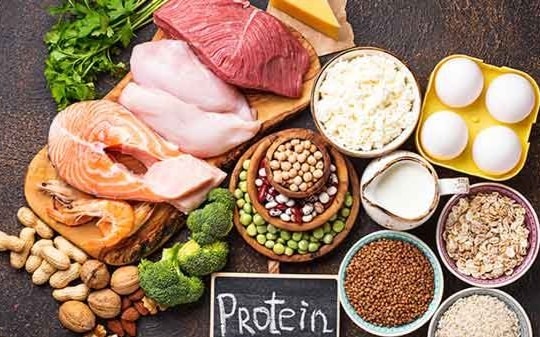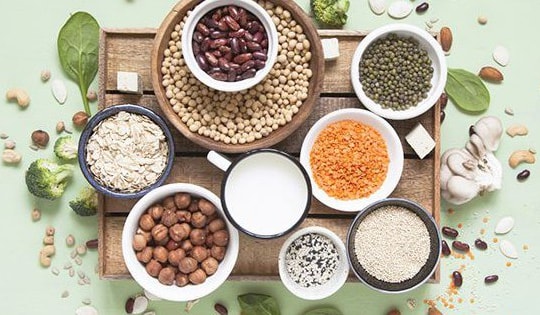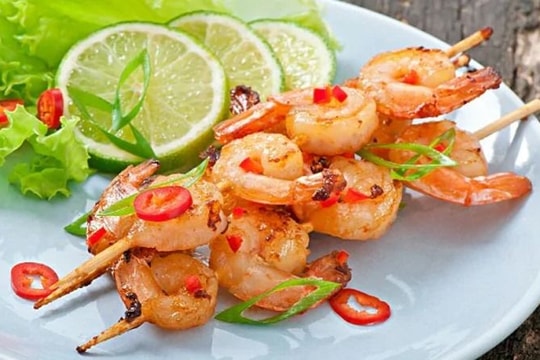The 7 Healthiest Lean Proteins You Should Eat Regularly
Lean protein is a food source with low fat content, low calories but provides high protein and many other essential nutrients, helping to develop muscle and control weight effectively.
Not all proteins are created equal. Protein-rich foods high in saturated fat, sodium, and other artificial ingredients (like fatty or processed meats) can do more harm than good, increasing your risk of heart disease, systemic inflammation, metabolic disease, and certain types of cardiovascular disease, as well as your risk of developing cancer. If you want to get more protein without the calories, healthy lean proteins that are high in protein and low in calories are the best choices of any food.
1. What is lean protein?
Including lean protein in your diet is the foundation of any health-promoting eating plan, especially if you are looking to manage your weight effectively. Lean protein is a low-fat, low-calorie protein.
According to the United States Department of Agriculture (USDA), in 28g of lean protein, there are only about 2 - 3g of fat. Lean protein helps support the regeneration and recovery of muscle tissue, cells, especially muscle growth, so it is very good for bodybuilders and athletes or those who want to gain muscle.
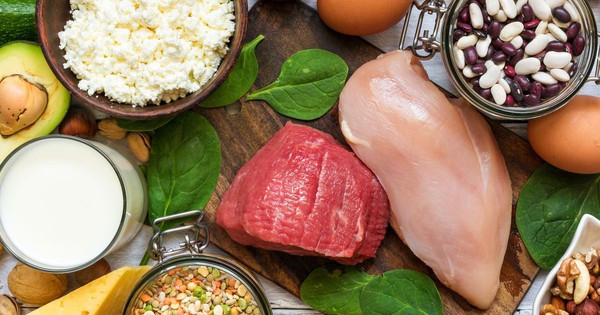
Although there is no official definition from the US Food and Drug Administration (FDA), the determination of lean protein is based on the following 3 criteria by nutrition experts:
Low in saturated fat: A serving of lean protein should have less than 3g of saturated fat. Calorie control: A healthy protein won't break your calorie count. A 100g serving of lean protein will provide no more than 150 calories. No questionable ingredients: The healthiest lean proteins are those with little or no added ingredients.
2.Foods that are healthy sources of lean protein
Explore and discover the health benefits of the healthiest lean proteins to fuel your daily meals.
Cod
Nutritional value (per 100g):75 calories, <5g fat, 16g protein.
Cod is one of the highest protein and lowest calorie seafood options. Because it is low in fat, the calorie count in cod is kept significantly lower than that of fatty fish such as salmon, mackerel or tuna.
Cod is an excellent source of vitamin B12 and a good source of vitamin B6, which has heart-health benefits. Cod also provides moderate amounts of omega-3 fatty acids, which have benefits for heart, eye, and brain health.
Skinless chicken breast is a healthy source of protein.
Nutritional value (per 100g):134 calories, 2.5g fat, 30g protein.
Chicken is the most popular animal protein. Skinless chicken breast is an exemplary lean protein source that has become popular for its nutritional benefits and versatility. Chicken breast is very low in fat, with only 2.5g of fat per 100g serving and only 1g of it being harmful saturated fat. With approximately 10g of protein per ounce (28.3g), a 100g serving contains a whopping 30g of high-quality protein with all the essential amino acids.
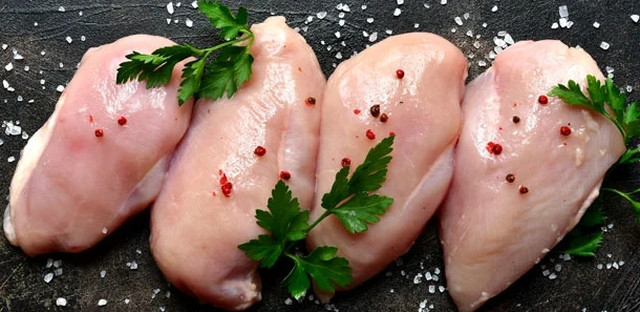
Research published in the journal Nutrients reports that several observational studies in humans suggest that enjoying chicken breast in place of higher-fat red meats may help with weight control and reduce the risk of heart disease and type 2 diabetes.
Fat-Free Cottage Cheese
Nutritional value (per 100g):104 calories, 0g fat, 15g protein.
Cottage cheese is a fresh cheese made from pasteurized or high-fat milk, but it is richer in protein than other cheeses, thanks to its simple production process and the lack of thickening agents.
Fat-free cottage cheese is a great way to add protein without adding extra fat or calories to your diet. Cottage cheese is rich in casein, a slow-digesting milk protein. Cottage cheese can increase feelings of fullness and reduce cravings to help you stick to your healthy eating goals.
Eating cheese after a workout is the perfect time to help your muscles recover and rebuild. Plus, cottage cheese provides protein, calcium, and essential vitamins and minerals like phosphorus, potassium, calcium, and vitamin B12. Research shows that cheese and other dairy foods help build and maintain your bones, lower blood pressure, and reduce the risk of certain cancers. In addition, cottage cheese provides beneficial probiotics that support your digestive health.
Egg whites
Nutritional value (per 100g):45 calories, <1g fat, 10g protein.
A study in the journal Foods reported that egg protein has an amino acid score of 100, making it the most easily absorbed protein you can eat. Studies show that egg white protein helps build muscle, lower harmful LDL cholesterol, and reduce body fat.
Egg whites have a high calorie-to-protein ratio because they are essentially fat-free. A great way to enjoy egg whites is to combine them with a whole egg, as the yolk is where vitamins A, D, E, and B, lutein, zeaxanthin, and many other essential nutrients are found.
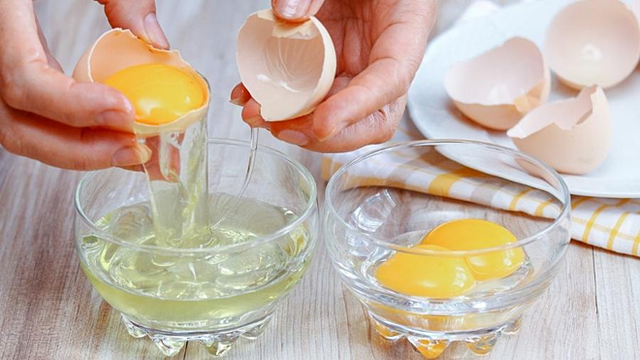
Fat-free plain Greek yogurt
Nutritional value (per 100g):92 calories, 0.5g fat, 16g protein.
If you want to take your diet to the next level, nonfat Greek yogurt is a must. This traditional Greek yogurt is strained to remove the liquid whey, resulting in a creamier, thicker yogurt with twice the protein and less sugar than regular yogurt.
A 180g serving of plain, non-fat Greek yogurt contains almost as much protein as three eggs. According to a study published in Frontiers in Nutrition, Greek yogurt can also help you gain muscle and lose body fat as part of a strength training program.
Soft tofu - an ideal source of vegetable protein
Nutritional value (per 100g): 72 calories, 3.5g fat, 9.5g protein.
For plant-based protein, tofu is a great choice because it contains all nine essential amino acids like animal-based protein foods. Plus, tofu is rich in nutrients and provides calcium, iron, magnesium, and B vitamins.
Soy foods contain isoflavones, which are known to help reduce inflammation, and they have been shown to reduce the risk of chronic diseases, including heart disease, some cancers, and type 2 diabetes. A recent study published in In Vivo found that consuming soy foods reduced the risk of breast cancer in pre- and post-menopausal women.
Cooked lentils
Nutritional value (per 100g):115 calories, 0g fat, 9g protein.
Lentils are a versatile and nutrient-dense legume that offers a wide range of health benefits due to their impressive protein and nutrient content, and they are rich in polyphenols. Because of the protein content in lentils, they help build muscle and maintain a healthy immune system.
According to research in the International Journal of Molecular Sciences, lentils are rich in polyphenols - plant compounds that have properties that lower blood sugar, aid in treating diabetes, prevent obesity, prevent hyperlipidemia, fight inflammation and reduce the risk of cancer. Lentils are also rich in fiber, which supports digestive health and promotes satiety, making them a valuable ingredient in weight management. Lentils also contain a variety of vitamins and minerals, including iron, folate and potassium.
Protein sources such as eggs, beef, poultry, fish and milk are generally considered good sources of protein. To make these sources 'complete', it is recommended to combine plant sources to provide the amino acid profile, e.g. a portion of beans and rice.
Dr. Hoang Thi Duc Ngan - Department of Community Nutrition, National Institute of Nutrition

